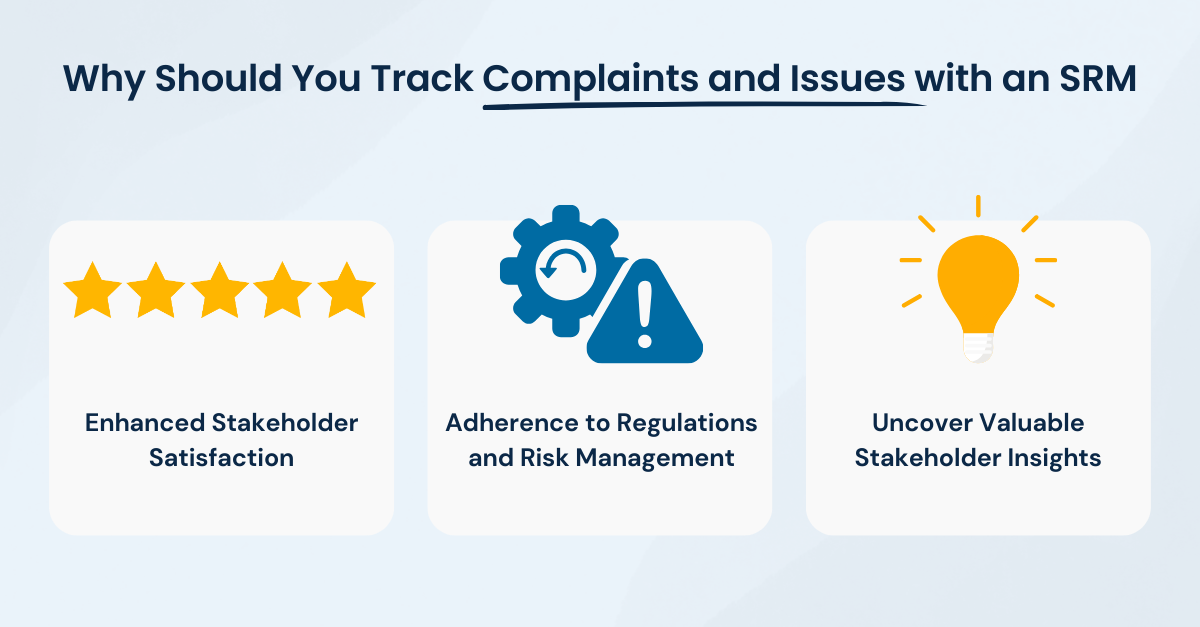While it’s nice to appreciate and oversee the positive interactions you have had with stakeholders, it is also equally important to keep an eye on and track any complaints or issues. Not only do complaints and issues help you gain valuable information, but they can also help you build a more positive relationship with your stakeholders by addressing matters of concern while improving your organisational reputation. To track complaints and issues more effectively, hundreds of organisations rely on a Stakeholder Relationship Management (SRM) platform.
Addressing issues before they turn into larger problems is always a better solution. With the aid of an SRM system, you can adopt a more advanced and streamlined approach to manage and promptly resolve complaints efficiently, before they escalate.
In this article, we will explore why you should use an SRM to track complaints and issues from stakeholders.

Three Reasons to Track Complaints and Issues with an SRM
Stakeholder complaints and issues can be efficiently monitored and more effectively addressed with the use of an SRM system, which can help you in achieving the following:
- Enhanced Stakeholder Satisfaction
- Adherence to Regulations and Risk Management
- Uncover Valuable Stakeholder Insights
1. Enhanced Stakeholder Satisfaction
You might be familiar with the saying ‘communication is key.’ Well, this is also true in the context of stakeholder engagement. We recognise that responses to complaints and issues must be informative and timely. On average, organisations take approximately 12 hours to respond to stakeholders.
With immediate access to stakeholders’ history, an SRM system empowers you to send well-informed responses by understanding their needs, concerns, and preferred communication channels. This can then demonstrate your commitment to addressing their concerns promptly. Furthermore, an SRM system has the capability to assign follow-up tasks to ensure that your stakeholders complaints receive the necessary attention. Ensuring the right people in your organisation follow-up with the right stakeholders using tasks helps to boost stakeholder satisfaction.
By leveraging an SRM system, you can also proactively monitor sentiments to ensure timely responses. Furthermore, the Email and SMS tools in Consultation Manager can be used to keep your stakeholders informed with alerts and updates, ensuring there’s continual and effective communication. You also have the ability to save email interactions to help you avoid any double-handling. So, by using an SRM system, you can tailor your messages confidently, segmenting stakeholder groups while understanding their needs, before you hit send.
2. Adherence to Regulations and Risk Management
It’s also important to ensure that your stakeholders’ complaints and issues have been handled in a compliant way. Effective regulatory compliance and risk management not only ensures that specific concerns will be resolved, but it can also demonstrate your commitment to handling matters in adherence with any established regulations and ethical guidelines.
When stakeholders can witness the transparent and compliant resolution of their complaints and issues, an additional layer of assurance is provided, which enhances the credibility of your organisation. This then contributes to building trust and confidence with stakeholders.
By employing an SRM system, you can proactively manage and respond to complaints in real-time. This can assist you by mitigating any risks to your project’s success. Managing complaints in a unified system provides a singular repository of complaint data that can be reported on and analysed for insights.
3. Uncover Valuable Stakeholder Insights
Another crucial aspect to consider is reporting capabilities. These features enable organisations to monitor trends and identify increasing issues over time, allowing them to address concerns before they escalate into significant problems. With effective reporting tools, organisations can effectively manage issues in real-time, ensuring proactive resolution and maintaining stakeholder satisfaction.
When you can easily monitor topics or issues that are consistently arising, you are able to remain proactive in your communications. This means you can not only understand what aspects of your strategy need to be reviewed, but also ensure your stakeholder engagement is addressing these topics effectively.
Active listening goes beyond hearing what’s been said. It also involves comprehending the emotions, concerns, and underlying messages of your stakeholders, to help you navigate conversations better, address problems proactively, and develop stronger relationships.
By actively listening to your stakeholders, you are showing them that you care. So, giving your stakeholders a voice enables them to express their concerns, to ensure that they feel heard and acknowledged.
Utilising a Stakeholder Relationship Management system can help by giving you a more streamlined approach to tracking your stakeholder’s complaints and issues more efficiently. It empowers your team to enhance stakeholder satisfaction, to ensure regulatory compliance and robust risk management, and to uncover valuable stakeholder insights. These collective efforts play a pivotal role in cultivating positive relationships and enhancing your reputation with stakeholders, ultimately positioning you for success.
